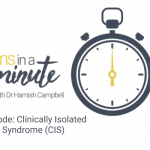The central nervous system (CNS) refers to the brain, spinal cord and optic nerve. It is named the central nervous system because it integrates information received from all of our senses, and coordinates and influences the activity of all the parts of the body.
The nervous system is divided into two areas:
- Central nervous system (CNS): This consists of the brain and spinal cord and is enclosed within the skull and spine.
- Peripheral nervous system (PNS): Is All other nerves. These connect the central nervous system to the rest of the body.
The CNS receives processes and stores information from the peripheral nerves and sends out messages telling the body how to respond.
Only nerves in the CNS are damaged by multiple sclerosis. However, MS can affect all parts of the body due to the damage blocking nerve messages within the central nervous system.
The CNS is made up of two types of cells – nerve cells or ‘neurons’ and support or ‘glial’ cells.
In fact, every person’s body contains billions of neurons. There are about 100 billion in the brain and 13.5 million in the spinal cord. The body’s neurons take up and send out electric and chemical signals – or electrochemical energy – to other neurons.
During a period of inflammation, attacking white blood cells can also kill glial cells. Glial cells surround the neurons and provide support and insulation between them. They keep these nerve cells healthy and produce new myelin when it’s damaged.
However, if glial cells are killed, they’re less able to keep up with repair. Some of the new research is focused on transporting new glial cells to the site of myelin damage to help encourage reconstruction.
Our MS in a Minute videos were created to provide fast and factual definitions of commonly used terms in MS.
More resources:
- Central Nervous System (MS Trust – United Kingdom)






